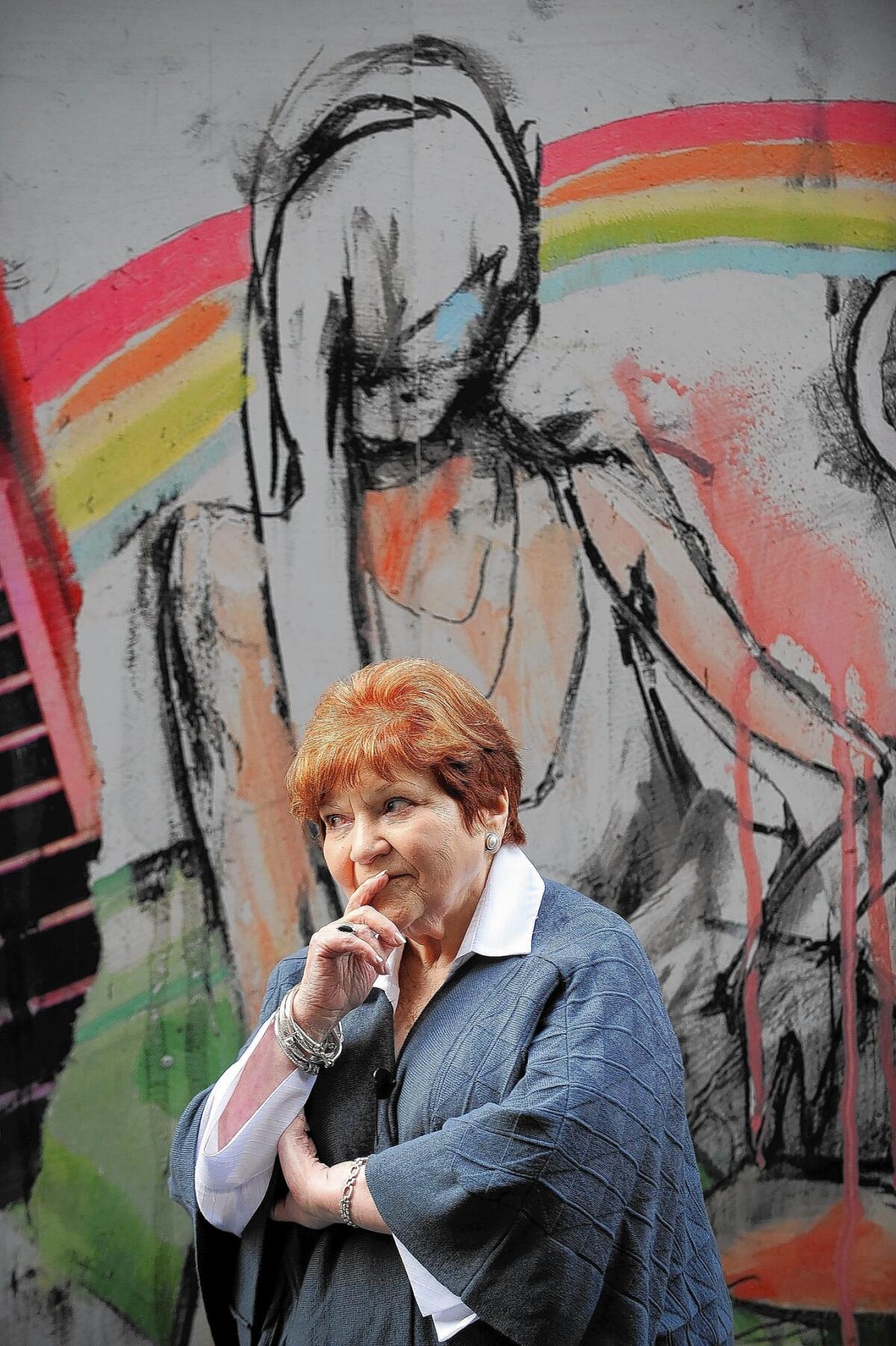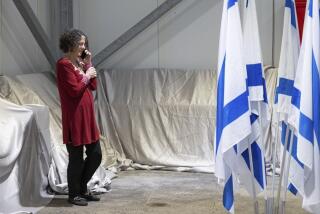Helen Bamber dies at 89; tireless activist for torture victims

Helen Bamber’s father read to her as a child in pre-war Britain, but there was nothing warm or comforting about the experience.
He read passages from Hitler’s anti-Semitic treatise “Mein Kampf” and articles by Hitler’s chief propagandist, Joseph Goebbels. He wanted his only child to understand “how language could be corrupted” to obscure evil intent. And he was warning her of the terrors ahead for Jews like them.
“I was well aware that we would be annihilated,” Bamber later recalled. “By the time I was 10, I knew it all.”
By 20 she knew what she had to do. She went to Germany to aid Holocaust survivors. They poured out their stories of unthinkable suffering and grief, setting the young woman on her life’s path.
Bamber, a relentless campaigner for the rehabilitation of those who have experienced humanity at its worst — victims of torture, genocide and war — died Aug. 21 in London. She was 89.
Her death following a series of strokes was announced by the Helen Bamber Foundation, one of two London-based human rights charities she founded.
The other group was the Medical Foundation for the Care of Victims of Torture (now called Freedom from Torture), which she founded almost three decades ago.
The organizations have served victims from 100 countries, including Chile, Argentina, Algeria, Somalia, Iraq and Kosovo, providing therapy, medical help and documentation of torture to support asylum requests.
With Bamber “it was possible to stand at the edge of the world and know how to first find and then hold an ember of life after atrocity,” Helen Bamber Foundation director T.J. Birdi said in a statement. “Refusing to be a bystander, her lifelong ability to represent those whose voices have been taken away was a rare and inspiring quality that earned her respect at the highest levels.”
Over the decades Bamber personally counseled thousands of victims, learning more than most people could bear about the psychic and physical wounds left by electric shocks, beatings, near-suffocation, relentless sexual assault, prolonged confinement and the forced witnessing of brutal acts on loved ones.
“Working with survivors was a 24/7 preoccupation with her. She did that pretty much for 70 years. There is nobody else you could say that about,” said Uwe Jacobs, former executive director of Survivors International, a San Francisco-based nonprofit organization providing psychological and medical support to torture victims.
Once, when Bamber was nearing 70, she forced herself to wear a torture hood so she could describe to a court a victim’s feelings of suffocation and panic. She had done it in preparation for testifying on behalf of a Palestinian prisoner who claimed he had been tortured by his Israeli jailers. The prisoner was freed. But accusing the Jewish state of torture was, Bamber later told her biographer, the hardest decision of her life.
Bamber had no formal training in psychology or social work, but she was brilliant at listening. She understood that recovery from grievous abuse begins with someone willing to be a witness to a victim’s rage, fears, pain and shame. With psychotherapists, medical doctors and others, she cataloged the effects of torture and developed a model for guiding the wounded toward “creative survival.”
“I am more angry with the bystander than with the actual torturer,” she told the Chicago Tribune in 1999. “Of course I am horrified with torturers and state torture, but I am constantly in contact with people who are complacent.... Change will only come if ordinary people are doing something.”
Born Helen Balmuth in London on May 1, 1925, she grew up in a contentious extended family. “I think that whatever ability I now have to contain anger and upheaval started with that family, because it was my only means of surviving,” she told biographer Neil Belton, who chronicled her life in “The Good Listener” (1999).
Her mother, Marie, was a cultured woman who wanted Bamber to become an actress. Her father, Louis, was a would-be philosopher who, Bamber said, “told me too much, made no attempt to protect me” from his apocalyptic predictions.
She spent much of the war in the countryside after Nazi forces bombed London. In 1945, after the war ended, she embarked on what Belton called her “strange self-education”: She joined a Jewish relief group and went to Germany to work with survivors of the Bergen-Belsen concentration camp.
She spent two years there, distributing food and medicine. Still, she felt useless — until she realized she could address another desperate need.
“People wanted to tell their story and I was able to receive it,” she said in the British newspaper the Observer in 2008. “They would hold me and dig their fingers in and rasp this story out. Somehow it was like a vomit. It didn’t matter what language it was in, or what the words were. They would rock back and forth and I would say to them ‘I will tell your story. Your story will not die.’
“It took me a long time to realize that that was all I could do — I couldn’t solve anything. But I could listen.”
After Belsen she returned to London to help resettle orphans who had been at Auschwitz. Later she worked as an advocate for hospitalized children.
In 1961 she joined the newly formed Amnesty International. In the early 1970s she helped the human rights advocacy group set up a medical section to treat asylum seekers who claimed they had been tortured in their countries.
Driven in part by efforts to document the torture of South African anti-apartheid activist Steve Biko, who died in police custody in 1977, Bamber left Amnesty International in 1985 to establish the Medical Foundation for the Care of Victims of Torture.
During two decades as the foundation’s director, she accepted the group’s first ex-serviceman for treatment, Eric Lomax, a British army officer who had been tortured during four years as a Japanese prisoner-of-war. His first meeting with her “was like walking through a door into an unexplored world, of caring and special understanding,” he wrote in a book about his experiences, “Railway Man.”
In 2005, when she was 80, Bamber founded the Helen Bamber Foundation and directed it until last year. The group worked not only with torture survivors but victims of human trafficking and female genital mutilation. “She recognized they were just as damaged as political prisoners and war survivors,” Jacobs said.
One person she could not help was her husband, Rudi Bamberger, a German Jew who changed his name to the more British-sounding Bamber after the war. His mother died in the camps and he saw Nazi thugs beat his father to death. Bamber said his impenetrable gloom slowly destroyed their 23-year marriage. They were divorced in 1970.
Bamber is survived by their sons, David and Jonathan, and a granddaughter.
On the patio of her London flat, Bamber grew geraniums. Sometimes she would crush one to release its sweet, dank scent. That was “the smell of Belsen,” she often said, which emanated from the bodies of those who survived the camp only to die of typhus. Breathing in that very particular smell, she explained, “has to do with the wish to forget and more primitive need to remember.”
Twitter: @ewooLATimes
More to Read
Start your day right
Sign up for Essential California for the L.A. Times biggest news, features and recommendations in your inbox six days a week.
You may occasionally receive promotional content from the Los Angeles Times.







